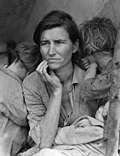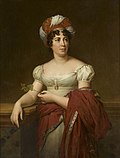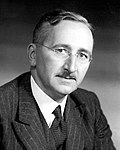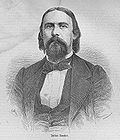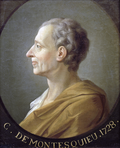Portal:Liberalism
The Liberalism portal
Liberalism is a political and moral philosophy based on the rights of the individual, liberty, consent of the governed, political equality, the right to private property, and equality before the law. Liberals espouse various and often mutually conflicting views depending on their understanding of these principles but generally support private property, market economies, individual rights (including civil rights and human rights), liberal democracy, secularism, rule of law, economic and political freedom, freedom of speech, freedom of the press, freedom of assembly, and freedom of religion. Liberalism is frequently cited as the dominant ideology of modern history.
Liberalism became a distinct movement in the Age of Enlightenment, gaining popularity among Western philosophers and economists. Liberalism sought to replace the norms of hereditary privilege, state religion, absolute monarchy, the divine right of kings and traditional conservatism with representative democracy, rule of law, and equality under the law. Liberals also ended mercantilist policies, royal monopolies, and other trade barriers, instead promoting free trade and marketization. The philosopher John Locke is often credited with founding liberalism as a distinct tradition based on the social contract, arguing that each man has a natural right to life, liberty and property, and governments must not violate these rights. While the British liberal tradition emphasized expanding democracy, French liberalism emphasized rejecting authoritarianism and is linked to nation-building. (Full article...)
Selected article -

The New Deal was a series of wide-reaching economic, social, and political reforms enacted by President Franklin D. Roosevelt in the United States between 1933 and 1938, in response to the Great Depression, which had started in 1929. Roosevelt introduced the phrase upon accepting the Democratic Party's presidential nomination in 1932 before winning the election in a landslide over incumbent Herbert Hoover, whose administration was viewed by many as doing too little to help those affected. Roosevelt believed that the depression was caused by inherent market instability and too little demand per the Keynesian model of economics and that massive government intervention was necessary to stabilize and rationalize the economy.
During Roosevelt's first hundred days in office in 1933 until 1935, he introduced what historians refer to as the "First New Deal", which focused on the "3 R's": relief for the unemployed and for the poor, recovery of the economy back to normal levels, and reforms of the financial system to prevent a repeat depression. Roosevelt signed the Emergency Banking Act, which authorized the Federal Reserve to insure deposits to restore confidence, and the 1933 Banking Act made this permanent with the Federal Deposit Insurance Corporation (FDIC). Other laws created the National Recovery Administration (NRA), which allowed industries to create "codes of fair competition"; the Securities and Exchange Commission (SEC), which protected investors from abusive stock market practices; and the Agricultural Adjustment Administration (AAA), which raised rural incomes by controlling production. Public works were undertaken in order to find jobs for the unemployed (25 percent of the workforce when Roosevelt took office): the Civilian Conservation Corps (CCC) enlisted young men for manual labor on government land, and the Tennessee Valley Authority (TVA) promoted electricity generation and other forms of economic development in the drainage basin of the Tennessee River. (Full article...)
Selected biography -
Sir Isaiah Berlin OM CBE FBA (24 May/6 June 1909 – 5 November 1997) was a Russian-British social and political theorist, philosopher, and historian of ideas. Although he became increasingly averse to writing for publication, his improvised lectures and talks were sometimes recorded and transcribed, and many of his spoken words were converted into published essays and books, both by himself and by others, especially by his principal editor from 1974, Henry Hardy.
Born in Riga (now the capital of Latvia, then a part of the Russian Empire) in 1909, he moved to Petrograd, Russia, at the age of six, where he witnessed the revolutions of 1917. In 1921, his family moved to the UK, and he was educated at St Paul's School, London, and Corpus Christi College, Oxford. In 1932, at the age of twenty-three, Berlin was elected to a prize fellowship at All Souls College, Oxford. In addition to his own output, he translated works by Ivan Turgenev from Russian into English, and during World War II, worked for the British Diplomatic Service. (Full article...)
List of selected biographies |
|---|
Selected quote
General images
Subcategories
Related portals
WikiProjects
Topics
Recognized content
Associated Wikimedia
The following Wikimedia Foundation sister projects provide more on this subject:
- Commons
Free media repository - Wikibooks
Free textbooks and manuals - Wikidata
Free knowledge base - Wikinews
Free-content news - Wikiquote
Collection of quotations - Wikisource
Free-content library - Wikiversity
Free learning tools - Wiktionary
Dictionary and thesaurus















